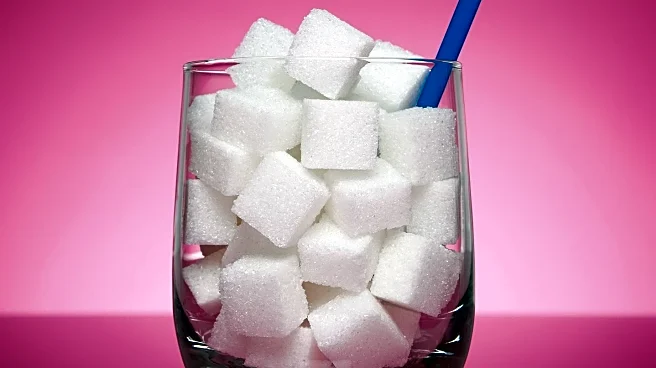What's Happening?
A study conducted by Monash University has found that consuming sugar-free diet drinks, such as Cola Zero, may increase the risk of developing Type 2 diabetes by 38%. This comprehensive 14-year study,
reported by ScienceAlert, highlights a higher risk compared to regular sugary sodas, which carry a 23% increased risk. Researchers adjusted for various factors including diet, exercise, and body weight, indicating that the elevated risk is not solely tied to obesity. The study suggests that artificial sweeteners, commonly found in diet drinks, may disrupt the gut microbiome and impair metabolism, contributing to the development of Type 2 diabetes. The findings emphasize the need for caution with sugar-free beverages marketed as healthier alternatives.
Why It's Important?
The study's findings have significant implications for public health, particularly in the U.S. where diet drinks are popular among consumers seeking healthier options. The potential link between artificial sweeteners and Type 2 diabetes could lead to increased scrutiny and regulation of these products. Consumers may need to reconsider their beverage choices, opting for water as a safer hydration option. This research could influence dietary guidelines and public health campaigns aimed at reducing diabetes risk. The beverage industry might face challenges as demand for sugar-free drinks could decline, impacting sales and prompting reformulation of products.
What's Next?
Further research is needed to fully understand the mechanisms behind artificial sweeteners' effects on health. This could lead to new studies exploring the long-term impact of these sweeteners on metabolism and gut health. Public health officials may consider revising dietary recommendations and launching awareness campaigns to educate consumers about the risks associated with sugar-free diet drinks. The beverage industry might respond by developing new products with alternative sweeteners or promoting water and other non-sweetened beverages.
Beyond the Headlines
The study raises ethical questions about the marketing of sugar-free drinks as healthier alternatives. It challenges the perception that these beverages are a safe choice for those looking to reduce sugar intake. The findings could lead to legal scrutiny and potential lawsuits against manufacturers if consumers feel misled about the health risks. Additionally, the study may prompt discussions on the cultural reliance on artificial sweeteners and the need for more natural dietary options.








